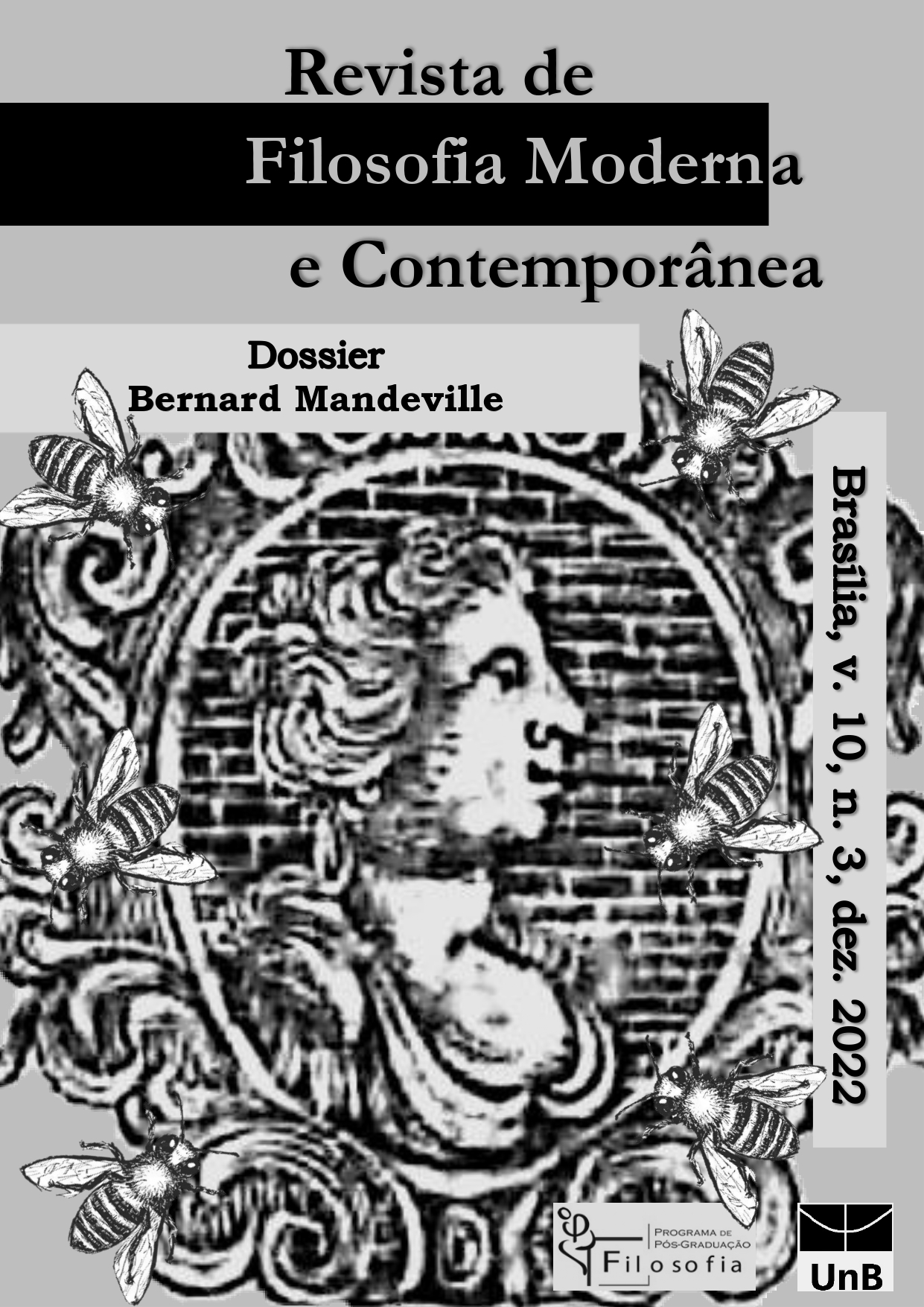Prescrições Mandevillianas: “The Planter’s Charity”, as Paixões e o Corpo Sofredor
DOI:
https://doi.org/10.26512/rfmc.v10i3.49428Palavras-chave:
Mandeville. The Planter’s Charity. Sociedade comercial. Paixões.Resumo
Neste ensaio, argumento que Mandeville explora emoções específicas de uma economia capitalista emergente. Mandeville ataca a crença sentimental e religiosa de que o comportamento virtuoso levará à recompensa de Deus e do mercado. No entanto, embora Mandeville rejeite o sentimentalismo, ele exibe uma aguda consciência do sofrimento. Como médico e filósofo, entende o alívio dos sofrimentos como parte do objetivo. Para algumas pessoas, observa Mandeville, a economia comercial emergente substituiu um tipo de sofrimento (esforço físico) por outro (melancolia). No entanto, para outros, traz um tormento físico implacável. Por essa razão, sugiro que o poema “The Planter’s Charity”, um poema sobre a hipocrisia de cristianizar os escravizados, é mandevilliano, se não realmente escrito por Mandeville. Seu Tratado de hipocondria e paixões histéricas explora o custo emocional de um sistema que cria tanta melancolia e o papel do médico na tentativa de aliviá-la. O interesse pelo corpo sofredor vem do poema “The Planter’s Charity”, de A fábula das abelhas e do Tratado.
Downloads
Referências
ALLEN, D. "Burning The Fable of the Bees: The Incendiary Authority of Nature." In The Moral Authority of Nature, by Daston, Lorraine, and Fernando Vidal, eds., edited by Lorraine Daston, and Fernando Vidal. University of Chicago Press, 2003.
BASKER, J. G., ed. Amazing Grace: An Anthology of Poems About Slavery, 1660-1810. New Haven: Yale University Press, 2002.
BROWN, T. C. “How Savages Came Into the World (Bernard Mandeville).” The Eighteenth Century: Theory and Interpretation 59, no. 4 (2018): 471–91.
CAREY, B. British Abolitionism and the Rhetoric of Sensibility: Writing, Sentiment, and Slavery, 1760-1807. Palgrave MacMillan, 2005.
CLAYDON, T. William III and the Godly Revolution. Cambridge Studies in Early Modern British History. Cambridge: Cambridge University Press, 1996.
COLLIER, J., 1650-1726. A Short View of the Immorality, and Profaneness of the English Stage Together with the Sense of Antiquity upon this Argument. London, 1698.
DAVIS, D. B. The Problem of Slavery in Western Culture. Ithaca, N.Y.: Cornell University Press, 1966.
FESTA, L. M. Sentimental Figures of Empire in Eighteenth-Century Britain and France. Baltimore: Johns Hopkins University Press, 2006.
GODWYN, M. The Negro's & Indians Advocate, Suing for their Admission to the Church, Or, A Persuasive to the Instructing and Baptizing of the Negro's and Indians in our Plantations Shewing that as the Compliance Therewith can Prejudice no Mans just Interest, so the Wilful Neglecting and Opposing of it, is no Less than a Manifest Apostacy from the Christian Faith: To which is Added, a Brief Account of Religion in Virginia / by Morgan Godwyn . London, Printed for the author, by J.D. and are to be sold by most booksellers, 1680.
GOLLAPUDI, A. Moral Reform in Comedy and Culture, 1696-1747. Performance in the Long Eighteenth Century: Studies in Theatre, Music, Dance. Farnham, Surrey: Ashgate, 2011.
HILL, A. Afer baptizatus: Or, The Negro turn'd Christian. Being a short and plain discourse, shewing I. The necessity of instructing and baptizing slaves in English plantations. II. The folly of that vulgar opinion, that slaves do cease to be slaves when once baptized. Delivered (most of it) in a sermon preach'd at Stratford-le-Bow in Middlesex, March the 15th 170 1/2. By Anthony Hill, lecturer there, and chaplain to His Grace the Duke of Richmond. London: Printed for Charles Broome, at the Gunin Ludgate-street; and Edward Evett, at the Green Dragon in St. Paul'd Church-yard, MDCCII. [1702]. Eighteenth Century Collections Online (accessed April 12, 2022).
HILTON, P. Bitter Honey: Recuperating the Medical and Scientific Context of Bernard Mandeville. Bern: Peter Lang, 2010.
HUNDERT, E. J. The Enlightenment's Fable: Bernard Mandeville and the Discovery of Society. Ideas in Context. Cambridge England: Cambridge University Press, 1994.
KAYE, F.B. “The Writings of Bernard Mandeville: A Bibliographical Survey.” The Journal of English and Germanic Philology 20, no. 4 (1921): 419–67; 447.
MANDEVILLE, B. An enquiry into the causes of the frequent executions at Tyburn: and A Proposal for some Regulations concerning Felons in Prison, and the good Effects to be Expected from them. To which is Added, A Discourse on Transportation, and a Method to render that Punishment more Effectual. By B. Mandeville, M. D. London: printed: and sold by J. Roberts in Warwick-Lane, MDCCXXV. [1725].
MANDEVILLE, B. The Fable of the Bees, or, Private Vices, Publick Benefits. Edited by F. B. Kaye. 2 vols. Indianapolis: Liberty Fund, 1988. First published by Oxford University Press, 1924.
MANDEVILLE, B. A Treatise of the Hypochondriack and Hysterick Passions. Second Edition: Corrected and Enlarged by the author. London, 1730.
MCCANN, T. J. "Lennox, Charles, first duke of Richmond, first duke of Lennox, and duke of Aubigny in the French nobility (1672–1723), landowner. "Oxford Dictionary of National Biography. 23 Sep. 2004; Accessed 19 Feb. 2022. https://www-oxforddnb-com.proxyum.researchport.umd.edu/view/10.1093/ref:odnb/9780198614128.001.0001/odnb-9780198614128-e-16449.
PONGIGLIONE, F. AND TOLONEN, M. “Mandeville on Charity Schools: Happiness, Social Order and the Psychology of Poverty,” Erasmus Journal for Philosophy and Economics 9.1 (Spring 2016), 82-100.
TOLONEN, M. Mandeville and Hume: Anatomists of Civil Society. Oxford: Voltaire Foundation, 2013.
Downloads
Publicado
Como Citar
Edição
Seção
Licença
Copyright (c) 2022 Revista de Filosofia Moderna e Contemporânea

Este trabalho está licenciado sob uma licença Creative Commons Attribution-NonCommercial-NoDerivatives 4.0 International License.
Direitos Autorais para artigos publicados nesta revista são do autor, com direitos da primeira publicação para a revista. Em virtude dos artigos aparecerem nesta revista de acesso público, os artigos são de uso gratuito, com atribuições próprias, em aplicações educacionais e não-comerciais.


